Given an unprecedented cost of living crisis, the UK electorate are turning against Brexit. The % regretting Brexit has grown to record level.
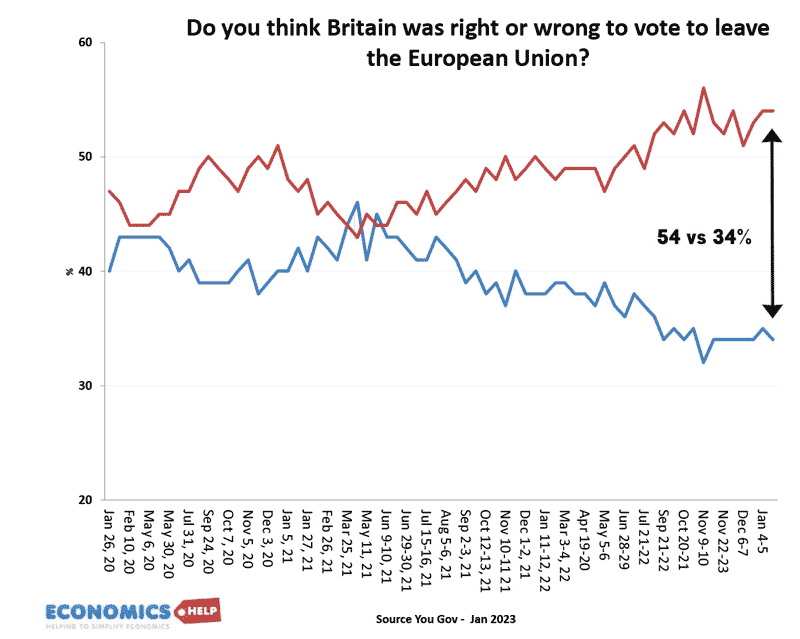
There is no chance of a quick return to the EU. Neither the UK or EU want it. But, what about the next generation of voters and politicians? If things can change so quickly in the past two years, what about the next 20 years? Could the UK rejoin? Something that seemed far-fetched a few years ago, now seems quite different.
Reasons why UK is likely to rejoin or get closer
1. Generational change
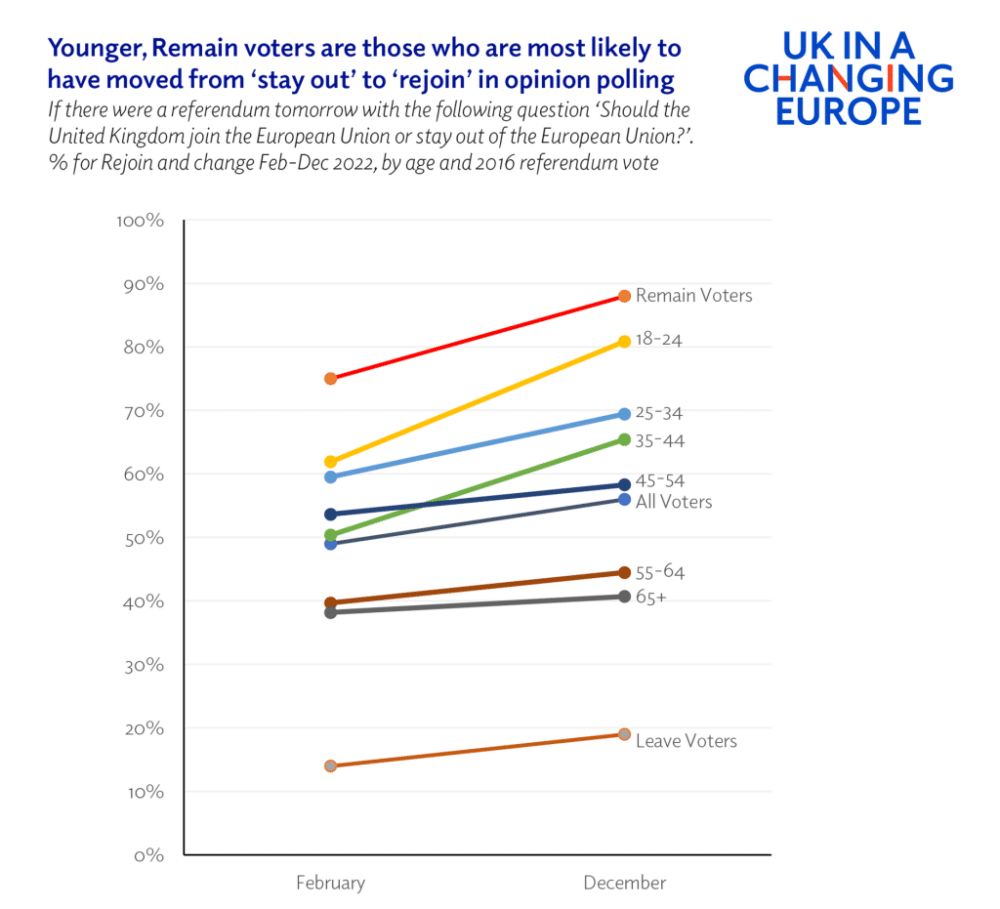
The first reason why the UK could rejoin the EU is the generational divide on Brexit. The only age group that currently supports Brexit are the over 65s. Amongst the young voters 18-24 who were too young to vote in 2016, 80% are in favour of rejoining. This compares to 40% of those over 65s.
The widening gap for regret over Brexit is partly due to some people changing their minds, but it is also demographics. The oldest Brexit voters are dying, whilst young, more pro-EU voters enter the electorate. All other things being equal, in 10-20 years, demographic changes will decisively shift the electorate to a pro-European Majority.
2. Economic Necessity
People voted for Brexit for a variety of reasons. It’s not just about economics. But for many Brexit voters, especially in working-class areas, there was a hope, Brexit may improve living standards, or at the very least not worsen them. Unfortunately, since 2016 and 2021 in particular, the UK economic situation has deteriorated with falling real wages and an unprecedented cost of living crisis which has dented confidence in Brexit. It is true, that the economic situation is at least partly due to external shocks of Covid and the Ukraine War. European countries are also suffering inflation and a cost of living crisis. However, even accounting for these external shocks, it is hard to ignore the impact of Brexit on investment, growth and trade.
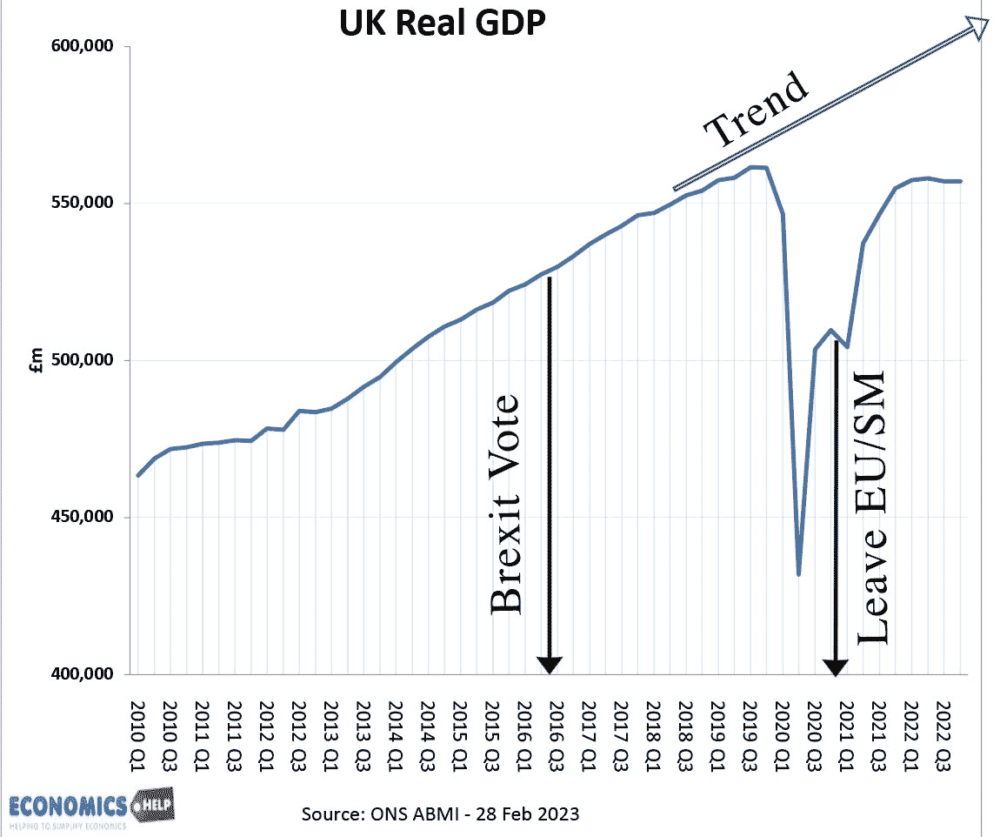
The OBR estimate a loss of 4% of GDP due to Brexit, and the European Centre for Economic Reform estimates a 5% loss. Whilst other countries have done badly, the UK is still one of the weakest performers in terms of wage growth, with one of the worst forecasts for 2023. If we were living in a period of rapid economic growth, it would be easier to absorb this economic shock of Brexit. But, we aren’t and in the minds of voters, the cost of living crisis will have a strong connection to Brexit. The hope of Brexit’s sunny uplands seems a long way distant.
3. Rehabilitation of EU Image
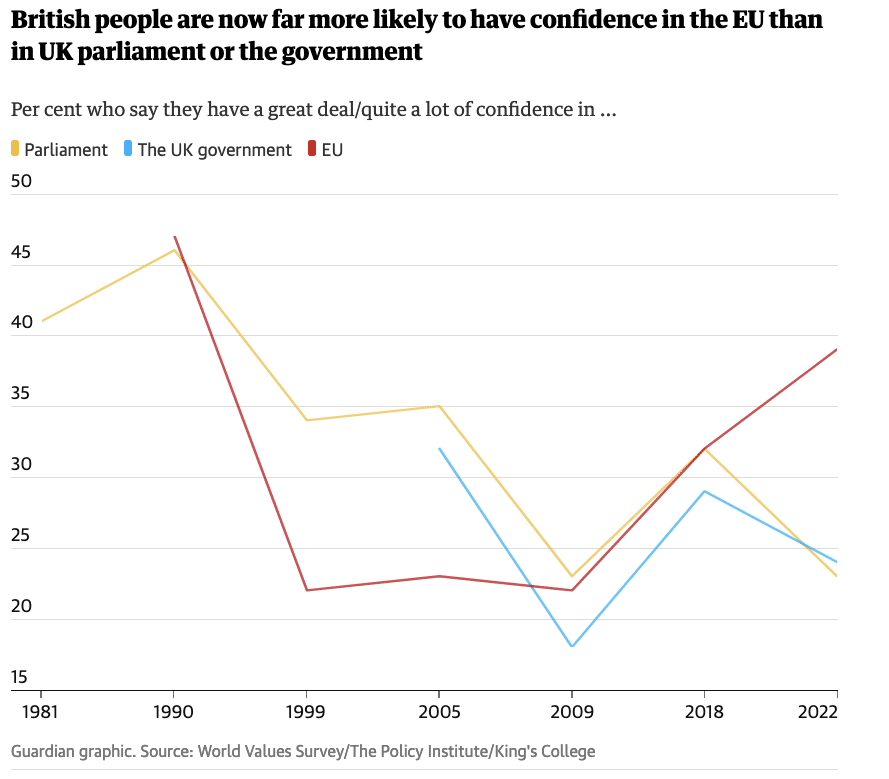
Whilst the UK were in the EU, it was the butt of many jokes. The British tabloids loved to poke fun at EU Rules and regulations.
The infamous EU ban on bendy bananas was symbolic of how Britain’s problems could be blamed on the EU. However, when you are not in the EU, it is no longer such an easy scapegoat. A survey from World Values Survey asked the electorate about trust in different institutions. Between 1990 and 2018, the UK parliament was comfortably ahead of the EU. But since 2018, this has gone into reverse with the EU gaining 39% confidence, with UK parliament and UK government polling less than 25%. The Ukraine war has put Brexit into context. It has shown that the ideal of European unity and democratic ideals is a major factor that binds the UK and Europe together. Arguments over fishing quotas, and trade laws pale into insignificance against the backdrop of military aggression against a European country.
4. Slowdown in globalisation
In the early 2000s, it seemed like globalisation was an unstoppable force. An argument for Brexit was that the UK didn’t need its near trading partner Europe, but should embrace the opportunities around the world, such as Asia and Africa. However, geo-political events have put a brake on this trend to ever greater globalisation. There has been a retreat towards focusing on trading blocks of particular regions. Relying on Chinese investment to fund your nuclear power stations no longer appears so appealing as it did in the past. Economists emphasise the importance of trade with your near neighbours. Known as gravity theory, it states that the optimal trade patterns tend to be countries in a close geographical proximity. Those countries who have similar living standards and cultural preferences. Given the importance of the UK’s trade with the European Union, it is unnecessary weight to impose extra checks, customs and tariffs on trade with Europe. All governments want to increase economic growth, but generally, it is hard to do. However, in the future, there is a very easy policy to improve UK growth prospects – rejoin the single market and end all the obstacles to trade. At the moment, it is not on the table. But, it is only a matter of time.
5. Less Pressure of immigration
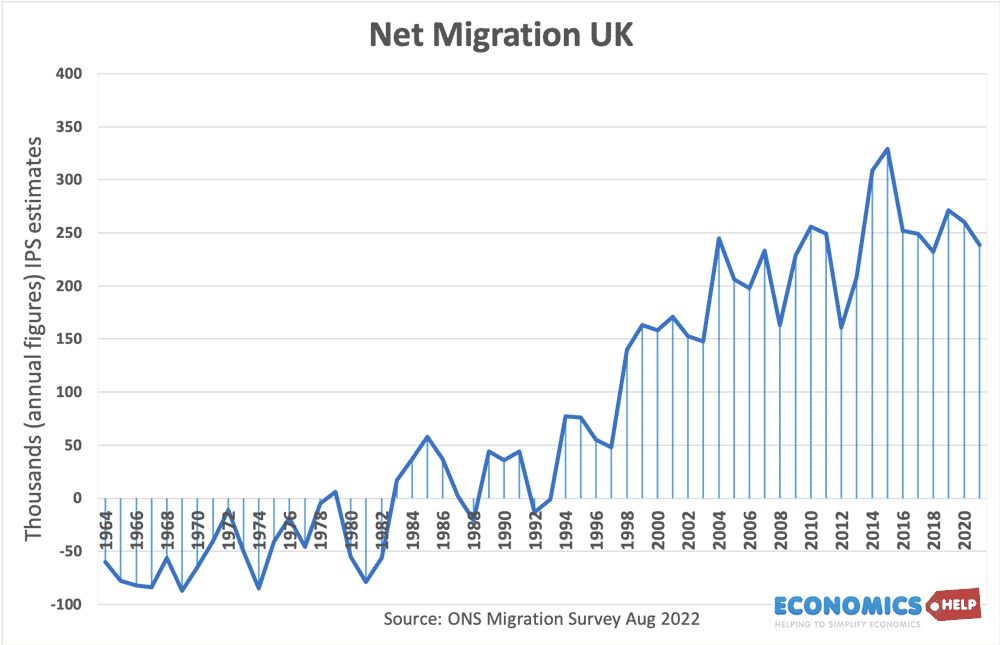
A key factor in the 2016 referendum was free movement of labour putting downward pressure on wages and local public services. In the years leading up to 2016, net migration did grow to record levels, causing net migration of up to 300,000 plus. Combined with austerity in public services, many voters felt they were losing out as mass migration was blamed for driving up house prices and longer waiting lists in hospitals. However, in 20 years’ time, this may all be very different.
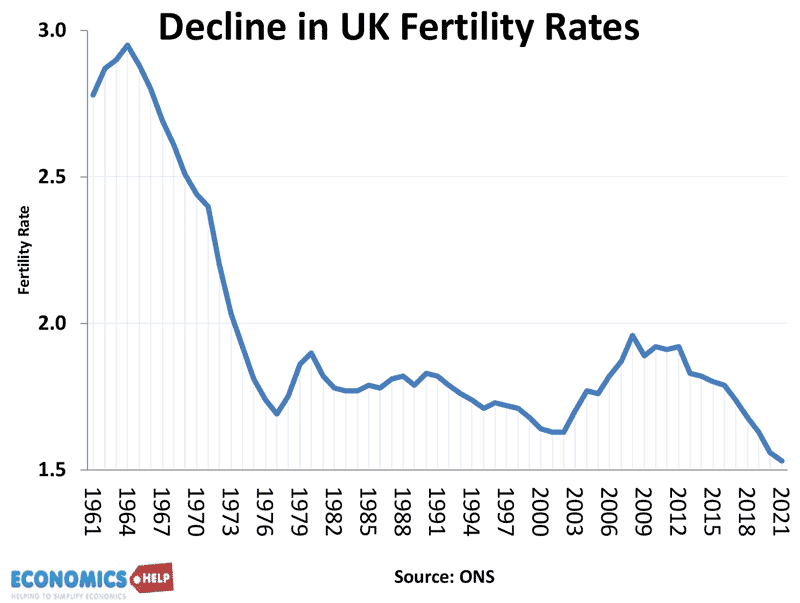
Firstly, the UK has a declining birth rate. Although not the lowest in the western world, it is well below the replacement ratio of 2.1.
It means without migration, the UK will have an ageing population and a shrinking workforce and in 10 years’ time a shrinking population. This will place huge pressure on government spending and pension commitments. Secondly, when Eastern countries joined the EU, there was a huge gap in wages between East and the West. There was a powerful incentive for eastern European workers to work in the UK for higher salaries. However, this wage gap is narrowing. Eastern European wages are catching up, and in 10, 20 years time, there may be very limited wage differential between the UK and Eastern Europe. Who knows perhaps UK workers will want to move to Europe to get higher wages.
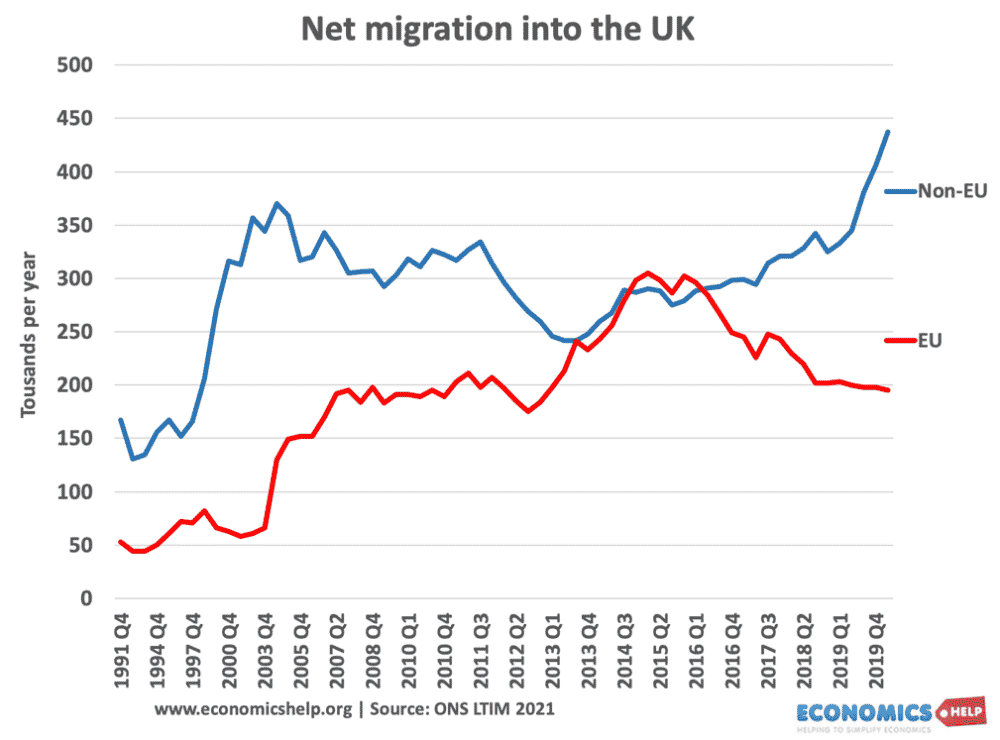
Also, an irony of Brexit is that reducing migration from the EU has caused non-EU migration to increase so overall levels of migration are relatively unchanged. But, the prominence of immigration in the media has fallen. Small boat crossing aside, it is much less of a political issue. The point is in 10 or 20 years, the free movement of labour within the EU may be seen in a very different light.
6. The Full Brexit
After the referendum, the narrow result 52-48 and uncertainty of what Brexit was, caused many to consider a second referendum and overturn the result. There may have been a certain logic, but if this had happened, it would have caused lingering resentment of a Brexit betrayal. But, for better or worse, the UK did embrace a hard Brexit – the full deal of leaving the single market, and customs union, ending free movement. Some may claim it is only the full Brexit when you leave the ECHR. But, the majority of average voters, know we did Brexit. The point is that by doing the full Brexit, it means the effects are very visible. If the next generation decide they don’t like it, we at least gave it the full try.
7. The Euro Problem
I agree the Euro is a major economic and political barrier to the UK ever rejoining the EU. I still believe this to be the case. However, although the EU have a written requirement that new countries pledge to join the Euro, will the EU actually want to enforce this? As some commentators pointed out, countries like Poland made a commitment to join the Euro, but wisely seem to have no intention of carrying it out. It is not inconceivable that the EU may decide compulsory Euro membership is no longer a requirement for rejoining. That would certainly make it easier, though maybe wishful thinking.
Conclusion
Will the UK rejoin the EU? We honestly don’t know. A lot can happen in five or ten years time. But, I do believe there are long-term pressures which will push the UK back to closer integration with the EU. The current trade friction between the UK and EU is quite significant and over time business will put pressure on the government to change. Also, a key issue is the age profile of voters. Over time, Brexit will have diminishing support and the next generation of voters and politicians are likely to have very different attitudes. It is certainly not a given the UK will rejoin the EU. It may be we end up being closer but still outside. Something like Norway or Switzerland, but the current situation doesn’t seem to have a long-term basis.
One thing is clear, for the UK to rejoin, it would not be done on a narrow majority like 52-48. It would probably require a sustained super-majority with consistent 55 – 60% + support for rejoining the EU. The Brexit referendum was run on a simple majority referendum, but in other countries, another way of making long-term drastic constitutional change is to require a super-majority of say 55% or 66% like in the US. A super majority may have drawbacks, but it avoids knife-edge constitutional change which divide a nation 50-50.
Further reading

ASs it is now clear that Brexit was a catastrophe and scam why dont we just rejoin and put johnson and Co in jail for treason
Try to re-enter the EU? What could we possibly have that they would like to have?
answer: NOTHING. We are now a third world country of no consiquence. Plus
our economy is crashing, lower than Russia and everybody else in the western world, add to that the leaving of car manufacturers and BT’s AI jobloses, with millions more to come.
Why would they want such a load of trouble? Politicians in Westminster are incable of
running anything let alone a country. Both parties are a terrible deal for the UK and so
down we go.
under no circumstances should the EU allow Britain to rejoin, when they were members they bemoaned, belittled and made the EU the butt of their moronic jokes..Now that the bleeding obvious has finally entered the moronic brains of the majority as simple sorry ain’t enough…
very much agree with the comments above, we were conned regarding Brexit and all the Brexit and Borris supports shout out ‘Look at what he achieved’ well he has ruined this country. Boris and his crew lied about brexit stating it was all about sovereignty, when it was about deregulation and lining their own pockets via their off shore bank accounts. Also Borris holds no scruples regarding the truth he will support any position that will further his self interest, probaly would have supported Hitler if it had benefited his position and ego, so much for the comparisons to the great leader Churchill.
UK does not understand what EU is and Brexit fortunately corrected this misunderstanding.
EU is not just a “single market” designed to fix UK economy.
This misunderstanding has led to UK applying to EU membership in the 60’s and resulted in a 50 year long EU/UK painful relationship (“I want my money back”, UK attempt to slow EU political integration, UK opts out of € and Shengen, UK against Turkey application to EU before Brexit and supporter of this application after Brexit, UK cancelling EU Boeing sanction after Brexit, Brexit appalling negotiations…)
After this field proven disaster of UK being part of EU, there is no way UK can ever rejoin EU.
UK is too keen on its “sacred sovereignity” ….While being at the same time a surprisingly unwavering support (vassal?) of the US (remember Iraki war or AUKUS or UK repeated attempt to torpedo Airbus…).
UK is better out of EU: it recovered its sovereignity… This sovereignity may have an economic price.
EU is better without UK that is an unreliable partner that does not share EU values
We should rejoin quickly Farage Johnson and his lies should go to jail, lies and more lies